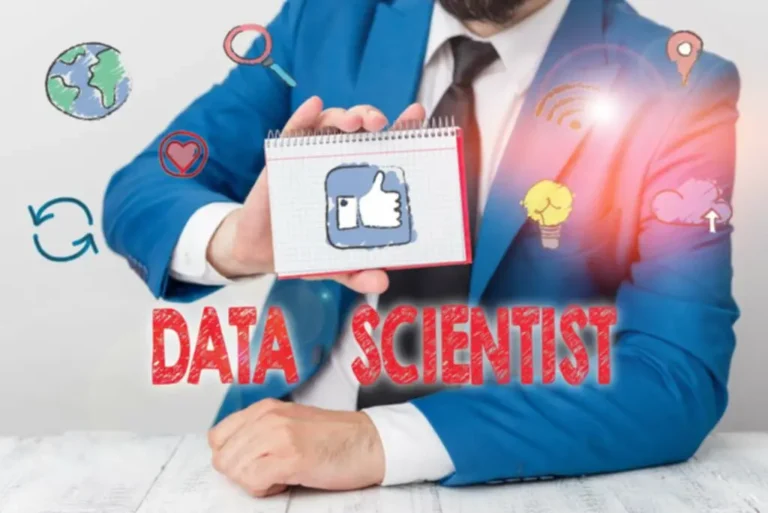What is data science and how to become a Data Scientist

Data science is a rapidly evolving field. Nowadays, data scientists work in almost every industry. They also hold positions at lean startups, Fortune 500 companies, and government organizations. In the article, we will talk about what is data science and how to make a successful career in this industry.
What is data science?
Data science is a sphere of study that works with vast amounts of data using modern tools and methods to find invisible patterns, derive meaningful information, and make business decisions. Data science uses complex machine learning techniques to generate predictive models. The data used for analysis comes from different sources and is presented in various formats.
The insights from data science help organizations improve operational efficiency, identify new business opportunities, improve marketing and sales programs, and more. Ultimately, they can lead to competitive edges over business competitors.

We are confident that we have what it takes to help you get your platform from the idea throughout design and development phases, all the way to successful deployment in a production environment!
Data science techniques and methods
Modern data science is based on machine learning algorithms. Machine learning is a type of advanced analytics in which algorithms study datasets and then look for patterns and insights. It combines supervised, unsupervised, semi-supervised, and reinforcement learning technologies, while the algorithms receive different levels of training and supervision from data scientists.
Deep learning is a more advanced variant of machine learning that uses artificial neural networks to analyze data in large volumes.
Predictive models are another critical element of data science. Data scientists use machine learning, data mining, or statistical algorithms to generate datasets to predict business scenarios and likely outcomes or behavior.
In predictive modeling, analysis of a representative subset of data is performed using a data sample. This data mining method makes the analytics process more manageable and less labor-intensive.
Data science is inherently challenging due to the progressive nature of the analytics it involves. The vast volumes of typically analyzed data complicate the work and increase the time to complete projects.
Additionally, data scientists often work with big data pools containing various structured, unstructured, and semi-structured data, complicating the analytics process.

Why is data science important?
Data science plays a critical role in almost every aspect of business operations and strategies. It provides customer insights that help companies deliver better marketing campaigns and targeted ads to increase revenue. It helps manage financial risk, detect fraudulent transactions and prevent equipment breakdowns in manufacturing plants. It allows you to block cyber-attacks and other security threats in IT systems.
Data science has found applications in many industries:
- Medicine: medical organizations are using data science to create sophisticated medical tools to detect and treat diseases.
- Gaming: videos and PC games are now created utilizing data science, taking the gaming experience to the next level.
- Image recognition: identifying patterns in pictures and detecting objects in an image is one of the most popular data processing applications.
- Recommendation systems: Netflix and Amazon make movie and product recommendations based on what a person watches or buys on such platforms.
- Logistics: logistics firms are using data science to optimize routes to deliver products faster and improve operational efficiency.
- Fraud detection: data science and related algorithms allow banks and other financial institutions to notice fraudulent transactions in time.
Data science empowers and facilitates better decision-making in all areas of human life.
What does a data scientist do?
Now, when you know what is data science, and you must be wondering what this job is like, here is the answer. A data scientist analyzes business data to extract meaningful insights. In other words, a data scientist solves business problems by performing a series of steps, such as:
- Before data collection and analysis begins, the data scientist defines the problem by asking the right questions and building understanding.
- Then the specialist determines the correct set of variables and databases.
- A professional collects structured and unstructured data from various sources – corporate data, public data, etc.
- Once the data is collected, the specialist processes the raw data and converts it into a format suitable for analysis. This procedure includes data cleaning and validation to ensure consistency, completeness, and accuracy.
- After transforming the data into a usable form, it is transferred to an analytical system — a machine learning algorithm or a statistical model; this is where data scientists analyze and identify patterns and trends.
- Once the data is fully processed, it must be interpreted to find opportunities and solutions.
- A skilled person completes the task by preparing the results and ideas to share with relevant stakeholders and communicate the results.
The job of data analysts and data scientists seems to be similar — both track trends or patterns in data to identify non-standard paths for organizations to make effective decisions about procedures. However, data scientists tend to have more responsibility and are generally considered more senior than data analysts.
How to become a data scientist?
If you have read about what is data science and are interested in such work, it is essential to remember that usually, becoming a data scientist requires formal training. Here are some steps to consider.
Get a Data Science Degree
Many employers want to see some academic credentials to ensure you have the know-how to tackle a data science job. Although this is not always required. However, an appropriate bachelor’s degree can certainly help – try to learn data science, statistics, or computer science to gain an edge in this area.
Hone the necessary skills
If you feel like you can hone some of your data science skills, consider taking an online course or enrolling in a related boot camp.
Here are some of the skills that will come in handy:
- Programming languages: data scientists use programming languages to sort, analyze, and otherwise manipulate large data blocks. Python, SQL, and SAS are the most popular programming languages.
- Data visualization: the ability to build charts and graphs is an integral part of being a data scientist. Preparation for work involves familiarity with special tools, such as Tableau, PowerBI, Excel.
- Machine learning: incorporating machine and deep learning into your work as a data scientist ensures continuous improvement in the quality of the data you collect and the potential to predict the outcomes of future datasets.
- Big data: some employers want to hire specialists who can work with big data. Hadoop and Apache Spark are the most common software platforms.
- Communication: even brilliant data scientists won’t be able to influence any change if they can’t communicate their findings intelligently. Data scientists should be able to share their ideas and results verbally and in writing.
It’s just the basic knowledge that will undoubtedly be helpful in the work.
Get an entry-level data analytics position
While there are many ways to become a data scientist, it’s better to start with an appropriate entry-level job. Try to find a data-intensive position, such as data analyst, business intelligence analyst, statistician, or data engineer. You can start the way to becoming a scientist from such a point, expanding your knowledge and skills.
Prepare for data science interviews
After a few years of working with data analytics, you will be ready to move to data science. Data scientist positions can be very technical so you may be asked technical and behavioral questions during an interview. Consider this opportunity, and practice saying your answer out loud. We recommend you prepare examples from your past work or academic experience; this will help you appear confident and knowledgeable in the interviewers’ eyes.
Data will be the life force of the business world for the foreseeable future. Knowledge is power, and data is the practical knowledge that differentiates between corporate success and failure. By incorporating data science into their business, organizations can predict future growth, foresee potential problems, and develop effective success tactics. It’s a good time for anyone who wants to start a career in science.
Top Articles
Container vs VM (Virtual Machines): How Do They Differ?
I am here to help you!
Explore the possibility to hire a dedicated R&D team that helps your company to scale product development.






